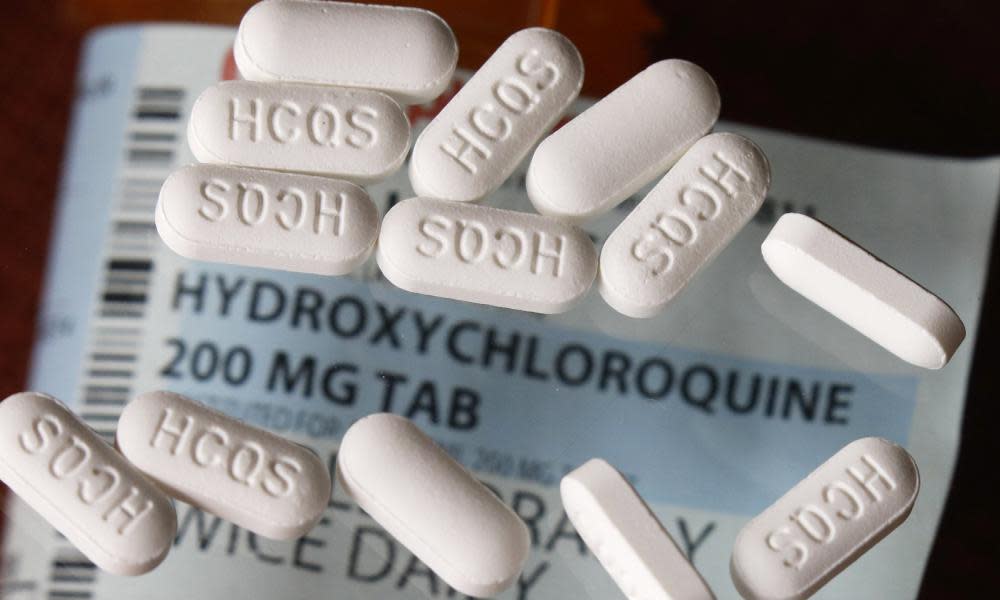Australian government experts at odds with health department over using hydroxychloroquine to treat coronavirus

The government’s expert panel on disease control has recommended against the use of a controversial anti-malarial drug, hydroxychloroquine, for treating coronavirus, directly contradicting the federal health department, which has told doctors they can prescribe it for patients.
The Australian Health Protection Principal Committee – the peak body that manages health emergencies – said experimental use of medications such as hydroxychloroquine for Covid-19 prevention and treatment was not recommended, and should only be prescribed as part of a clinical trial.
“Appropriate dosage of medications for use in Covid-19 are not yet determined, and there is concern that if used inappropriately, off-label use of medications may cause toxicity and lead to adverse patient outcomes,” the latest AHPPC advice on use of the drugs for Covid-19 says.
“Due to safety concerns, and the unknown effects of prescribing these medications for off-label usage, such as for Covid-19 infection, there are no current recommendations to treat patients with mild to moderate Covid-19 illness.”
But the Department of Health confirmed on Wednesday that as well as being used in clinical trials, the drugs may be given “in a controlled environment in the treatment of severely ill patients in hospital”.
It comes as one of the institutions being supported by the government to run clinical trials of the drug for Covid-19 treatment, the Royal Brisbane Women’s Hospital Foundation, has refused to answer questions from Guardian Australia about the trial and wrongful descriptions of the drug by a professor leading the trial as a “cure”.
After initially agreeing to answer questions, a foundation spokeswoman has not returned emails or responded to calls. The foundation trial has received favourable coverage from Channel Seven. The broadcaster has not responded to questions from Guardian Australia.
Australian virologists and doctors have warned that hydroxychloroquine can cause severe and even life-threatening side-effects, and have cautioned against using it for conditions for which it has not been tested. It is a proven treatment for malaria and for some autoimmune conditions. Studies on its efficacy as a Covid-19 preventative or treatment are mixed. Much of the focus on the drug came after a small French study, which has since been widely disputed and been found to have omitted data containing spurious results. A small study from China found no benefit to chloroquine being given to Covid-19 patients.
Related: Trump touts hydroxychloroquine as a cure for Covid-19. Don't believe the hype
Hydroxychloroquine has also caused division within the White House, Axios reported, after the US president, Donald Trump, hyped it as a “game changer” in treating the virus. The White House infectious disease expert warned Trump that evidence for the drug was only anecdotal and far from proven. Meanwhile, a hospital in France has stopped administering the drug to Covid-19 patients owing to cardiac side-effects.
On Saturday Guardian Australia revealed that a delegate of the health minister, Greg Hunt, had exempted hydroxychloroquine, chloroquine, Remdesivir, Lopinavir and Ritonavir from a requirement to be listed on the Australian register of therapeutic goods, which is generally the only way medicine can be lawfully supplied in Australia.
The exemptions specified that the medications “must only be supplied in Australia for the prevention, treatment or alleviation of coronavirus disease (Covid-19) following advice from the Australian government department of health”.
In a press conference on Wednesday Hunt was asked by Guardian Australia whether he was concerned about the drugs being used off-label.
“The AHPPC gave very wise advice on the use of different medicines and they were very clear about the situation about off-label use, but also talked about appropriateness of clinical trials,” he said.
Hunt said clinical trials were “entirely within the appropriate medical conduct”, but declined to offer a view about off-label usage.
“I’ll let medical advisers provide the medical advice, that’s the appropriate balance,” he said.

 Yahoo News
Yahoo News 
